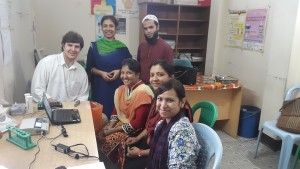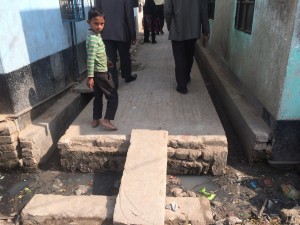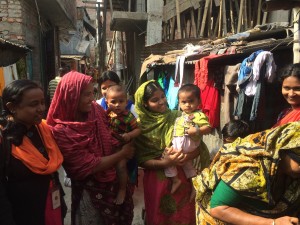
Peds ID Fellow Jeff Donowitz recently wrapped up a two-year study that took him half a world away in a search for answers to problems of malnutrition, stunted growth and oral vaccine failure seen in millions of children.
A two-year research effort took Jeff Donowitz, M.D., half a world away in a search for answers to problems of malnutrition, stunted growth and oral vaccine failure seen in millions of children.
Now, armed with fresh data from the study, he’s ready to move forward, continuing his research on how overgrowth of bacteria in the small intestine is damaging the guts of children in low- and middle-income countries.
In 2014, Donowitz, an infectious diseases fellow in VCU’s Department of Pediatrics, was one of just seven pediatricians in the U.S. chosen by the Association of Medical School Pediatric Department Chairs for the Pediatric Scientist Development Program. Over the past two years, he traveled frequently to Dhaka, Bangladesh, seeking to identify a viable cure.
Donowitz’s interest in international public health medicine was ignited by trips to Haiti when he was younger. Later, as he was looking for potential research topics, his interest was piqued by environmental enteropathy, a low-level chronic inflammation in the GI tract that’s found in a large number of children living in unsanitary conditions.
“The effects of environmental enteropathy are very, very broad,” he says. “We have limited understanding of exactly what about it is affecting growth stunting, cognitive delays or oral vaccine failures, so that is partially what we are trying to figure out.”

A Bangladeshi child reminds Donowitz not to step in the open sewer. Environmental enteropathy is a low-level chronic inflammation in the GI tract that’s found in a large number of children living in unsanitary conditions.
His fellowship afforded him the opportunity to examine the issue under the mentorship of William Petri, M.D., Ph.D., the respected chief of Infectious Diseases and International Health at the University of Virginia. Bangladesh has world-class research facilities, including the International Centre for Diarrhoeal Disease Research, Bangladesh, notes Donowitz.
He hypothesized that small intestine bacterial overgrowth (SIBO) could, in part, explain those problems in poor communities. “When I started, there were only a few studies looking at SIBO in low-income countries, and most of them were just describing that it was there in large numbers. That’s where I got into the field.”
In his two-year fellowship, Donowitz says his hypothesis proved credible. Overgrowth, which was found in one in six children tested, was indeed associated with inflammation in the GI tract.
But other findings surprised him. “I had thought maybe SIBO was related to diarrheal disease but what we showed was that it’s really related to poor sanitation. So what is it about poor sanitation that leads to overgrowth in these children?”
Donowitz has a hypothesis about that, which he is exploring in a new, larger study of 275 Bangladeshi children who he is following from birth to age 2. “We’ll be measuring SIBO at multiple time points.” With that, he hopes to identify opportunities when treatment will be beneficial for the large numbers of children affected by SIBO.

Armed with his study data, Donowitz is ready to move forward, continuing his research on how overgrowth of bacteria in the small intestine is damaging the guts of children in low- and middle-income countries.
“The nice thing about SIBO is that you can treat it with relatively low-cost antibiotics,” he notes. “But the downside to that is antimicrobial resistance. The idea of giving antibiotics on a large scale to a lot of people is not very attractive.”
Not only is Donowitz advancing knowledge about childhood disease, he’s proved to himself that he can secure funding. That’s important, as this fall he’ll be submitting grant requests to continue his work.
Donowitz has a message to prospective researchers. “I think a lot of times, young, smart people get put off of it because they hear that funding is hard to come by. Don’t be dissuaded by the first person who says there’s no money in it. It’s extremely rewarding.”
By Lisa Crutchfield

